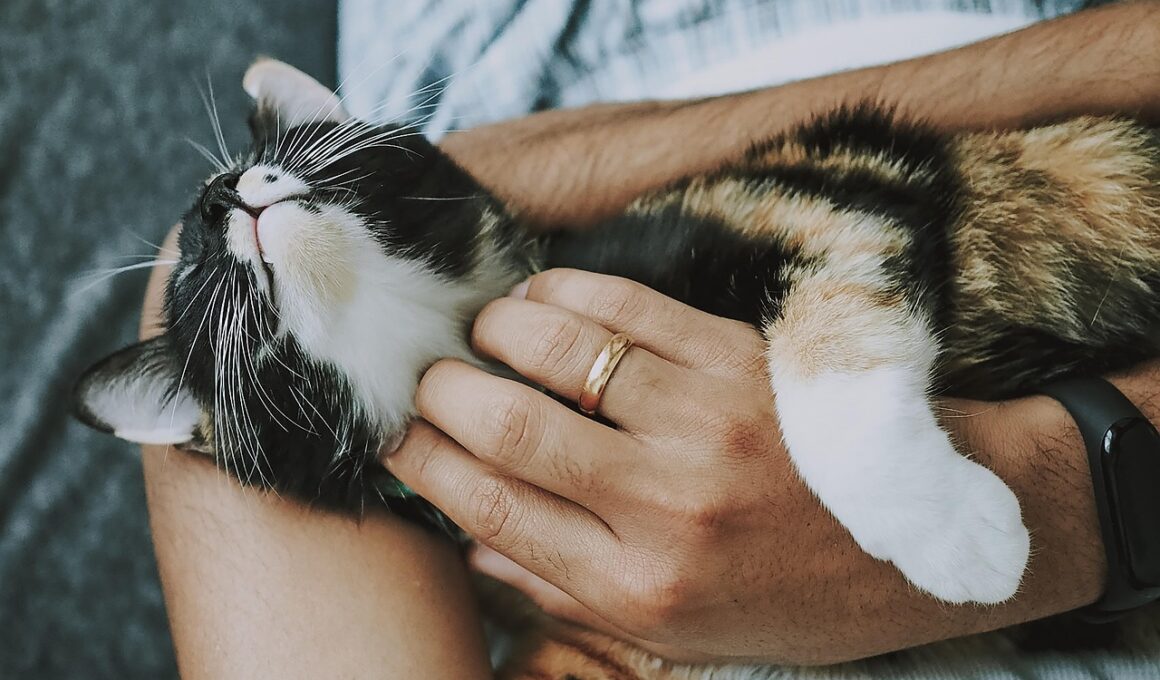DIY Dental Care Routines: Brushing Techniques for Senior Cats
Taking care of your senior cat’s dental health is vital. Regular brushing can significantly improve their quality of life. A cat’s oral hygiene contributes to their overall health. Neglecting dental care can lead to various health issues, such as periodontal disease and tooth decay. Start by choosing the right toothbrush and toothpaste specifically designed for cats. Never use human toothpaste, as it can be harmful. Get your cat used to the brushing process gradually. Allow them to explore the toothbrush first. Ensure that the toothbrush has soft bristles to avoid damaging your cat’s sensitive gums. Initially, gently rub their teeth with your fingers to help them get accustomed to the sensation. You can also use dental treats in parallel to keep your cat motivated. Setting a regular routine, ideally once a week, is essential for maintaining good dental hygiene. Early detection of dental issues can save money and avoid suffering down the line. Incorporate routine vet check-ups to professionally clean your cat’s teeth as well and assess any ongoing dental health issues.
Steps for Effective Brushing
When you’re prepared to start brushing, follow these effective steps to ensure your senior cat tolerates the process well. Make sure your environment is calm and positive. Calm your cat down with soothing words or light petting before the brushing session. With the toothbrush ready, lift your cat’s lip gently and start to brush their outer teeth surfaces. Brush in a circular motion for optimal cleanliness. Focus on the area where the gum meets the teeth, as this is where plaque tends to build up. Remember to avoid heavy pressure as this can make your cat uncomfortable. Keep an eye on their body language; if they seem stressed, take a break. Reward your cat with gentle praise and their favorite treat afterward to create a positive association. It may take time for your senior cat to adjust, especially if they’ve never had their teeth brushed before. Be patient and consistent. You might encounter resistance, but with persistence and care, your cat will learn to accept regular dental care.
To further assist in maintaining your senior cat’s dental health, consider incorporating dental wipes or gels into the routine. These products can be used alongside brushing to enhance oral hygiene. Dental gels often contain enzymes that help inhibit plaque and tartar build-up, while wipes effectively eliminate surface debris. To use dental wipes, gently rub them along your cat’s teeth and gums. Both products are designed to be more palatable than traditional brushing, making them an ideal supplement to your dental care routine. Observe your cat’s response to various dental products, as not all cats have the same preferences. Consult your veterinarian for their recommendations on safe and effective dental care products tailored to senior cats. Additionally, ensure that your cat is receiving a balanced diet, as this plays a crucial role in overall dental health. Dry kibble can be beneficial compared to wet food due to its abrasive texture. A high-quality diet assists in minimizing plaque accumulation and will support your cat’s teeth, gums, and overall health with every meal.
Regular Veterinary Check-Ups
Regular veterinary check-ups are crucial for monitoring your senior cat’s dental health. These appointments offer an opportunity for professional cleaning, examination, and vital dental care advice tailored to your cat. Regularly checking for signs of dental disease, such as swollen gums, bad breath, or loose teeth, ensures early detection and treatment. Your veterinarian may recommend X-rays to assess hidden dental issues below the gum line. It is essential to communicate any concerns you have noticed at home during these visits. Listen to helpful recommendations for diet adjustments and dental care routines tailored to Feline health. Ultimately, the goal of these veterinary visits is to ensure your senior cat maintains their quality of life as they age. You should also inform your veterinarian of any changes in behavior related to eating or grooming, as these could indicate dental discomfort or pain. Being proactive can prevent significant health issues and provide peace of mind, knowing that your beloved feline is receiving proper dental attention and care throughout their golden years.
In addition to brushing and regular vet appointments, consider the value of dental chew toys. These toys are designed to help clean your cat’s teeth while they enjoy chewing. Chewing can naturally remove plaque as it interacts with their teeth, thereby promoting dental health. You should select dental toys specifically labeled for cats and be cautious of any toys that might pose a choking hazard. Monitor your cat’s utilization of these toys, as not all cats are inclined to chew. Chew toys should be supplementary to a comprehensive dental care routine. Combining brushing, professional cleanings, dental wipes, and chew toys can lead to enhanced oral hygiene for your senior cat. Take time to evaluate the durability of these toys, ensuring they are safe and withstand your cat’s chewing habits. As you introduce new dental care products, take note of their reactions. Each cat’s preferences are unique, and observing their behavior can guide you in creating an effective dental health regimen that fits seamlessly into their everyday life at home.
Signs of Dental Issues
Being observant of your senior cat’s dental health is essential. Various signs can indicate potential dental issues that require immediate attention. These include persistent bad breath, which may suggest plaque or decay. Also, observe if your cat is reluctant to eat or plays with toys, as pain can cause hesitance. You might notice excessive drooling or difficulty while eating, which can signify serious problems such as infection or broken teeth. Moreover, swollen gums or bleeding are clear indicators of gingivitis, a common condition among senior cats. To ensure your feline companion remains healthy and happy, develop the habit of checking their mouth regularly. Regular inspections can help you become familiar with their normal dental appearance. If you notice any irregularities, like discoloration or roughness on their teeth, consult your veterinarian promptly for evaluation and appropriate treatment. Proactive dental care is critical in alleviating discomfort in senior cats. By keeping a close eye on their dental health, you can intervene early, ensuring a longer and healthier life for your furry friend.
Integrating these dental care techniques into your senior cat’s routine is a commitment that pays off. Dental care not only prevents painful conditions but can also enhance overall well-being. The relationship between oral health and systemic health is vital, as untreated dental issues can lead to complications affecting organs such as the heart and kidneys. Thus, maintaining your senior cat’s dental health can be a significant investment in their overall longevity. This careful attention to detail and proactive measures create an environment where your cat can thrive. Furthermore, the bonding moments during brushing can enhance your bond with your pet. Dedicated time spent on brushing can foster trust and reduce anxiety surrounding veterinary visits. Gradually, the routine can evolve into a seamless part of your weekly activities. Embrace the opportunity to prioritize your senior cat’s happiness. Although it may require persistence at first, the long-term rewards are abundantly clear. Invest time in learning proper techniques and approaches tailored to your cat’s unique needs, ensuring a healthier and happier future.
Finally, remember to celebrate milestones in your cat’s dental care journey. Recognizing efforts made toward better dental hygiene encourages both you and your cat to commit to ongoing care. Every successful brushing session can be a cause for reward and praise. Create a ritual to end each session positively, whether through treats or playtime. This not only solidifies good oral hygiene but makes it an enjoyable experience. Document your cat’s progress and challenges, allowing you to refine your approach consistently. Engaging with online communities can provide support and tips from other cat owners facing similar challenges. Connect with various resources such as articles, blogs, and forums to learn more about feline dental health. This collaborative approach can help alleviate some pressures you might face while navigating this responsibility. Whether you’re first-time owners or seasoned pet parents, every improvement makes a difference. Ultimately, enthusiastic involvement in your senior cat’s dental care leads to a happier, healthier, and longer life filled with moments of joy and companionship.


